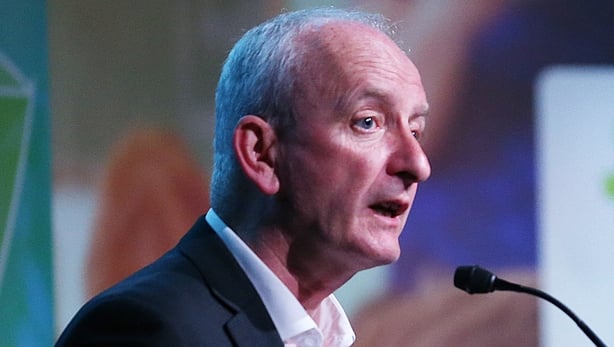Health Service Executive CEO Bernard Gloster has said that the "simple reality" is that the level of funding for next year is "not adequate" to run the health service based on the costs of operating it this year.
However, he said two critical areas it will not be leaning back on is managing urgent care access in emergency departments and scheduled care access on waiting lists.
"Both of those are heavily funded and I intend to continue to pursue the improvements on those."
He made his comments following the Budget announcement earlier this week and also following the latest announcement of a recruitment freeze.
Under Budget 2024, €22.5 billion was allocated for the public health system. Minister for Public Expenditure Paschal Donohoe said that this includes an €808 million increase in core current funding to address demographic and service pressures.

Speaking on RTÉ's This Week, Mr Gloster said the health service has had very good increases in funding over recent years, which have been put to good use, with good outcomes for the public.
However, he anticipates the deficit in the health service to be close to €1.5 billion, excluding disability services.
"All of that €1.5 billion cost will be brought forward and repeated again next year so that cost will still be there and we will have to pay those bills."
He added that the existing level of service principle is long established in public sector funding and the department estimates around €1.2 billion extra next year.
"So you can see those figures are quite substantial in the order of between €2.4 and €2.7 billion is essentially what would be required when you take the 2023 deficit and 2024 cost of running that."
He described the "unprecedented and unforseen" level of demand for health and social services this year, saying 80,000 more people went onto waiting lists this year than had been estimated.
"That is significant of just one part of the many demand factors we deal with."
He described how the HSE can control certain areas and their focus to run the deficit to the "minimum amount" without cutting vital services.
He said that means focusing on pay, agency and overtime and said "you spend what you have rather than what you don't have".
Regarding employment he said: "I simply can't hire more people than I am funded to do. We have record numbers of people working in the health service."
He said there will be a "significant slowdown" in clinical programmes next year regarding their further development rate and it will be a year of "consolidating".
Mr Gloster said the waiting list action plan is funded to happen again next year.
"Some 80,000 more people came on to the list than we planned for this year but equally we took off more than 70,000 people more than we were targeted for this year.
"So, we have shown enormous efficiency, productivity and creativity in our responses to waiting lists."
He said the size of waiting lists is not the core issue, it is the length of time people are waiting.
"We have managed to reduce times," he said, adding that Ireland is one of the few countries that has been able to achieve that.
He said his job is to manage risks regardless of the constraints and the service plan for 2024 being put forward to the minister will include a built in deficit, which "is the first time in my memory of service planning that it would be the case.
"We have very significant levels of funding and staffing but we do not have enough to do what we are currently doing today." he said.
Mr Gloster said recruitment processes have been very successful this year and he outlined why a recruitment freeze is now taking place.
"What I am doing is simply capping the recruitment to what was targeted to be done this year and what is affordable."
He confirmed also that managers will have to work within a certain budget allocated to them next year.
Regarding the freeze on recruitment of junior doctors, he said the HSE planned to increase the numbers this year by 500 and by September it has already increased by 777.
"That is why the pause is there," he said.
